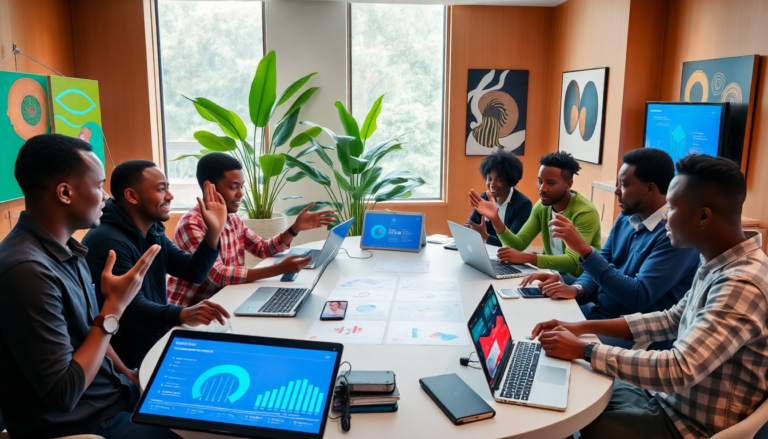Argomenti trattati
The recent Global AI Summit held in Kigali, Rwanda, is a striking example of the continent’s ambition to leverage the power of artificial intelligence to address its unique challenges. While the world is engrossed in discussions about lofty aspirations like artificial general intelligence (AGI), countries in the Global South are taking a more pragmatic approach. They’re focusing on practical applications that promise immediate benefits. This shift not only highlights Africa’s growing technological capabilities but also contributes to a broader narrative about the evolving landscape of AI on a global scale.
The Context of the Summit
With over 2,000 delegates from more than 90 countries, the Global AI Summit was more than just a conference; it marked a pivotal moment for Rwanda and the continent. Set against the somber backdrop of the 1994 genocide remembrance, the event showcased Rwanda’s commitment to becoming a technological leader. The Kigali Convention Center, an architectural gem on the city’s edge, served as an inspiring venue, symbolizing hope and progress.
One of the summit’s most significant announcements was the creation of a $60 billion fund dedicated to fostering AI initiatives across Africa. Coupled with the Africa Declaration on Artificial Intelligence, endorsed by 54 countries, this signifies a unified vision for the continent’s digital future. These commitments reflect a growing recognition of AI’s transformative potential—not just as a driver of economic growth but also as a tool for tackling pressing social issues.
As African leaders convened to discuss AI, the focus was on crafting solutions tailored to local contexts. Conversations revolved around identifying practical use cases that can be effectively deployed given existing infrastructure—an essential consideration for many regions grappling with resource constraints. A great example of this focus is the establishment of the Rwanda Artificial Intelligence Scaling Hub, which aims to uncover and implement AI solutions in critical sectors like healthcare, agriculture, and education.
Diverging Narratives in AI Development
The conversation around AI is markedly different in the Global South compared to the tech hubs of Silicon Valley or European capitals. While wealthier nations are immersed in the pursuit of AGI, Africa’s narrative centers on applied artificial intelligence (AAI)—the drive for immediate, tangible benefits. This practical approach prioritizes real-world applications over theoretical advancements, homing in on how AI can solve concrete problems faced by communities.
Consider AI solutions that optimize agricultural practices or enhance healthcare delivery. These innovations not only boost productivity but also have a direct impact on the livelihoods of millions. The Nigerian Communication Minister’s emphasis on the need for clarity in AI goals underscores a collective desire among African nations to focus on practical outcomes rather than lofty aspirations.
Moreover, the burgeoning development of vernacular chatbots and offline AI applications showcases the ingenuity emerging from the Global South. For instance, initiatives like PlantVillage Nuru, which helps Kenyan farmers diagnose crop diseases without the need for internet access, highlight AI’s potential to effect meaningful change where it is most needed.
Opportunities and Challenges Ahead
While this focus on practical AI applications presents numerous opportunities, it also brings its own set of challenges. Financial constraints are a significant hurdle for many countries in the Global South, often limiting the scope of AI projects. The staggering investments made by tech giants in the West starkly contrast with the budgets available for AI development in developing nations.
Technical limitations further complicate matters. Many advanced AI models require substantial resources and are not easily adaptable to local languages and contexts. As a result, developers in the Global South are increasingly turning to open-source solutions that offer flexibility and customization. This frugal innovation approach, often referred to as ‘jugaad’ in India, emphasizes practicality and adaptability in the face of resource scarcity.
However, the emphasis on use cases must be approached with caution. Critics warn that a narrow focus on practical applications might lead to an overselling of AI solutions that lack sufficient user bases or fail to tackle deeper systemic issues. As the global AI landscape continues to evolve, the challenge will be finding a balance between the pursuit of innovation and the need for inclusivity and equitable access to technology.
Ultimately, the developments emerging from the Global South could redefine the global narrative around AI. By prioritizing grassroots innovation and practical applications, African nations have the chance to lead the way in demonstrating how AI can be harnessed to deliver tangible benefits for society. As the world watches, the lessons learned from these initiatives may provide valuable insights into the future of AI and its role in addressing some of humanity’s most pressing challenges.

